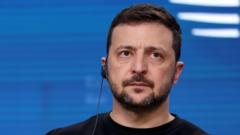In a recent interview with Sky News, Ukrainian President Volodymyr Zelensky proposed that the territories under Ukrainian control could seek shelter "under the NATO umbrella" to help halt the ongoing war. He indicated a willingness to accept NATO membership for these areas, but clarified that such an offer should apply to the entire country, including territories currently occupied by Russia.
Zelensky's comments were made in a context of speculation rather than formal diplomatic negotiations; however, they carry significant implications. He emphasized that any invitation to join NATO could not only pertain to the parts of Ukraine currently held by Kyiv, as this might signify recognition of the division of Ukraine, thereby ceding legitimacy to the Russian claims over occupied territories.
"Ukraine has never considered such a proposal, because no one has officially offered it to us," said Zelensky. He pointed out the risks associated with ceasefires that lack reliable enforcement mechanisms, stressing that only NATO membership could provide sufficient guarantees against future Russian aggression.
He also expressed optimism that the war could conclude within the next year if Ukraine’s allies demonstrated enough resolve. Discussion surrounding a model reminiscent of West Germany's divided state and NATO membership has been circulating among Western officials for over a year, yet no formal proposals have surfaced.
Zelensky is also keen to engage with U.S. President-elect Donald Trump, as he plans to dispatch a delegation to discuss potential strategies. Trump’s administration appears to be exploring options that balance military support for Ukraine with the necessity of engaging in peace negotiations. Under Trump’s plans, U.S. military assistance to Ukraine would be tied to a willingness to pursue talks, but military support would continue in the event of a ceasefire.
The core challenge for Zelensky remains unanswered: what security guarantees can be expected from the Trump administration if NATO membership is delayed? He asserted that without NATO, Ukraine's independence remains at risk from Russian advances.
While Zelensky's position reflects a desire for constructive engagement, the contrasting approaches between his administration and the Russian government remain evident. Since Russia's annexation of Crimea in 2014 and the subsequent invasion, President Putin has shown no willingness to acknowledge the potential for any Ukrainian territories to join NATO, making such discussions appear theoretically distant at this stage.
In this intricate geopolitical landscape, Zelensky is striving to keep avenues for peace open, despite the overwhelming challenges presented by continued hostilities.
Zelensky's comments were made in a context of speculation rather than formal diplomatic negotiations; however, they carry significant implications. He emphasized that any invitation to join NATO could not only pertain to the parts of Ukraine currently held by Kyiv, as this might signify recognition of the division of Ukraine, thereby ceding legitimacy to the Russian claims over occupied territories.
"Ukraine has never considered such a proposal, because no one has officially offered it to us," said Zelensky. He pointed out the risks associated with ceasefires that lack reliable enforcement mechanisms, stressing that only NATO membership could provide sufficient guarantees against future Russian aggression.
He also expressed optimism that the war could conclude within the next year if Ukraine’s allies demonstrated enough resolve. Discussion surrounding a model reminiscent of West Germany's divided state and NATO membership has been circulating among Western officials for over a year, yet no formal proposals have surfaced.
Zelensky is also keen to engage with U.S. President-elect Donald Trump, as he plans to dispatch a delegation to discuss potential strategies. Trump’s administration appears to be exploring options that balance military support for Ukraine with the necessity of engaging in peace negotiations. Under Trump’s plans, U.S. military assistance to Ukraine would be tied to a willingness to pursue talks, but military support would continue in the event of a ceasefire.
The core challenge for Zelensky remains unanswered: what security guarantees can be expected from the Trump administration if NATO membership is delayed? He asserted that without NATO, Ukraine's independence remains at risk from Russian advances.
While Zelensky's position reflects a desire for constructive engagement, the contrasting approaches between his administration and the Russian government remain evident. Since Russia's annexation of Crimea in 2014 and the subsequent invasion, President Putin has shown no willingness to acknowledge the potential for any Ukrainian territories to join NATO, making such discussions appear theoretically distant at this stage.
In this intricate geopolitical landscape, Zelensky is striving to keep avenues for peace open, despite the overwhelming challenges presented by continued hostilities.





















